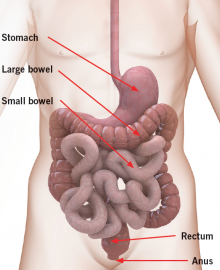What is Bowel/Colorectal Cancer?
Colorectal cancer is the 4th most common cancer, and accounts for 11% of the cancers across the UK.
Bowel cancer, also known as colorectal cancer or colon cancer, is any cancer that affects the colon (large bowel) and rectum (back passage). It usually grows very slowly over a period of up to 10 years, before it starts to spread and affect other parts of the body.
How does bowel cancer start?

Most bowel cancers start as benign innocent growths - called polyps - on the wall of the bowel. Polyps are like small spots or cherries on stalks and most do not produce symptoms. Polyps are common as we get older and most polyps are not pre-cancerous. One type of polyp called an adenoma can, however, become cancerous (malignant).
If left undetected the cancer cells will multiply to form a tumour in the bowel, causing pain, bleeding and other symptoms. If untreated, the tumour can grow into the wall of the bowel or back passage. Once cancer cells are in the wall, they can travel into the bloodstream or lymph nodes; from here the cancer cells can travel to other parts of the body. For bowel cancer, the most common places for bowel cancer cells to spread to are the liver and the lungs. The process of spread is called metastasis. Not all polyps become cancerous, and they may be removed during a colonoscopy to reduce the chance of bowel cancer developing. The good news is that bowel cancer can be successfully treated in over 90% of cases, if diagnosed early.
It is also possible to get cancer of the anus. This is usually a type of skin cancer. If this is diagnosed, treatment options will be considered and treatment could be either at the Royal Bournemouth Hospital or at Poole Hospital NHS Trust.









